Author: Eva Glass
Eva Glass first rose to prominence in The INQUIRER. She continues to work behind the scenes to dig out the best stories.
Anthem said that hackers stole the identities of customers across all of its business units.
It has about 37 million customers in the USA and has reported the attack to the Federal Bureau of Investigations (FBI).
It has said it has now closed the hole but that’s somewhat equivalent to closing the gate once the horse has bolted.
The hackers do not appear to have had access to Anthem customers’ credit card records.
It has set up a website to try to explain what happened, with its CEO and president claiming his company had state of the art information security systems.
He said that despite that, his company “was the target of a very sophisticated external cyber attack. These attackers gained unauthorised access to Anthem’s IT systems”.
Anthem has hired a company called Mandiant to assess its IT systems.
Sheffield said: “Anthem will individually notify current and former members whose information has been accessed. We will provide credit monitoring and identity protection services free of charge.”
Swatch gets into the smart watch market
 If Apple thinks it will have its own way in the smart watch category this year, it had better think again.
If Apple thinks it will have its own way in the smart watch category this year, it had better think again.Swatch is planning to introduce a smart watch in the next three months and it’s going to have some advantages over the Apple device.
According to Bloomberg, the watch can communicate with the internet without needing to be charged, will work with Windows and Android and will let you make mobile payments.
Swatch has something of an advantage over Apple too in that it’s been in the market for decades and has had touch screens since the end of the 20th century.
It also knows its market and has distribution deals that Apple cannot possibly match.
Further, attempts by companies like Intel and Google to launch TV services haven’t exactly been the dish of the day.
While some analysts are predicting huge sales of smart watches, others are more sceptical. Young people, by and large, don’t tend to wear watches and use their smartphones for telling the time.
People need to be convinced that spending money on duplicate functions makes any sense at all.
Video drives the mobile data market
IDC estimates that mobile data traffic will show double digit growth in 2015 – by 59 percent.
The company said in a report that while faster networks and more affordable 4G handsets are playing their part, the real reason for data growth on this scale is mobile video apps and other streamed content.
In 2013, mobile data traffic was 19,049,158 terabytes but by this year that figure will grow to close to 52 million terabytes while in 2016 the figure will not be far off 80 million terabytes.
IDC thinks 4G service prices will continue to fall but 3G still has its place, particularly in the non-Western markets.
By 2018, the company believes that people using 4G handsets will generate 46 percent of data traffic.
By 2018, it estimates that 4G devices will churn 5.5GB of data a month, three times more than a 3G smartphone.
Right now, mobile video generates 50 percent of all mobile data and that number is set to increase. And video calling services are also set to grow.
Facebook faces European probe
 Data protection authorities in the European Union are getting edgy about Facebook’s privacy policy, it’s been reported.
Data protection authorities in the European Union are getting edgy about Facebook’s privacy policy, it’s been reported.Facebook released a new privacy policy at the end of last week which, among other things, even tracks you when you’re not logged into the social network.
You are automatically “upgraded” to the new privacy policy but you can choose to opt out.
According to PC World, authorities in Belgium, the Netherlands and Germany have formed a group in the belief that Facebook may breach the European Union’s privacy rules.
Other elements of Facebook policy the authorities are investigating include it claiming rights to data from profiles for business, and sharing of data with third parties.
The same report says that German authorities are worried about Facebook sharing information with its subsidiaries, such as Instagram.
Facebook always maintains that anything it does is to help individual users.
But the company makes its revenues from advertising – and its users are a means to that end.
European data protection authorities are increasingly cooperating with each other to keep multinationals like Facebook and Google on their toes.
The British ICO recently extracted a promise from Google that it would work to improve its privacy policy in Europe.
British firm promises flexible displays
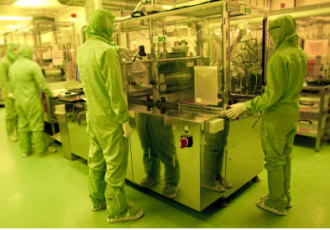 A company based in Cambridge claimed that by the end of this year it will produce properly flexible displays by the end of this year.
A company based in Cambridge claimed that by the end of this year it will produce properly flexible displays by the end of this year.FlexEnable is aiming to position its OLED displays into mobile products, wearables, surface displays and imaging systems.
On its website it says that the display could be used on smartphones with wraparound displays that can open out into tablet size. The material is flexible enough to be folded in half.
It also envisages including screens that are so flexible they can be built into clothes and follow the curves of the body.
It also sees its displays being built into both cars and aircraft designs, using complex curves and irregular shapes.
The technology also has medical uses, creating flexible x-ray sensors. The technology can be as thin as 25 nanometres. It provides reference kits to its clients so they can make their own products. The company also claims to have created graphene based displays.
FlexEnable is a spin off of Plastic Logic and believes its technology will become an element of the internet of things.
Silicon chips to be one atom thin
The researchers, based at the University of Texas at Austin said the breakthrough promises “dramatically faster, smaller and more efficient computer chips”.
The silicon is called silicene and the team demonstrated that it could be made into transistors, the basic building block of a central processing unit (CPU) in a computer.
According to lead researcher Li Tao, until a few years back silicene was a purely theoretical material but by studying graphene, which is also one atom thick, scientists theorised that a similar material could be based on the element silicon.
However, silicene is unstable and to fix this problem, scientists created a new method for fabricating it.
They allowed a hot vapour of silicon atoms to condense on a crystalline block of silver in a vacuum chamber, then forming a silicene sheet and adding a nanometre thick layer of alumina on the top. They could then scrape some silver to leave behind two islands of metals as electrodes with silicone between them.
Although the work is in its early stages, the team believes that the discovery will lead to low energy, high speed computer chips.
Apple PCs make a dent in the marketplace
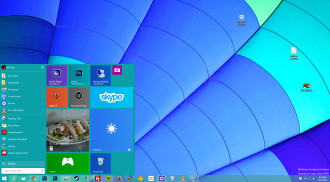 While the conventional Windows PC market continues to decline, it appears to be losing market share to Apple’s range of PCs.
While the conventional Windows PC market continues to decline, it appears to be losing market share to Apple’s range of PCs.That’s the conclusion of Taiwanese vendors who have told local wire Digitimes that global PC shipments are expected to fall by over three percent during 2015.
Apple, on the other hand, is set to do much better, with growth of between 10 and 15 percent during 2015, amounting to shipments of between 20 and 23 million worldwide.
Apple is gaining additional traction from more competitive prices and Digitimes said it expects the company to drop prices on its 11 inch and 13 inch notebooks when it launches a 12-inch Macbook Air this year.
While traditional PC sales have been hit by smartphones and tablets to some extent, Microsoft’s delays in shipping Windows 10 will also not help sales.
Microsoft is responding to vendors’ complaints about the excessive price of licensing its operating system by introducing aggressive pricing in a bid to boost the market during 2015.
Organisations anticipate internet of things
 Although there’s still a clear lack of standards with different vendors vying to take the lead, many organisations are getting ready for the internet of things (IoT).
Although there’s still a clear lack of standards with different vendors vying to take the lead, many organisations are getting ready for the internet of things (IoT).
Companies including Intel, Qualcomm, Google and others want to have a big stake in the future of IOT.
And there’s no doubt the hype is generating interest.
That’s the conclusion of market research company Gartner which said in a study that 40 percent of businesses think the IoT will have a “significant” impact in the next three years.
Nick Jones, a senior analyst at Gartner, said: “Only a small minority has deployed solutions in a production environment. However, the falling costs of networking and processing mean that there are few economic inhibitors to adding sensing and communications to products costing as little as a few tens of dollars”.
But even though many organisations are anticipating the IoT, few have put executives in leadership roles.
The main concerns of the people surveyed are security and privacy. And there is a shortage of people with the relevant skills to plot the future.
Authentication market value to soar
 By the end of this year, mobile multi-factor authentication software and services will be worth $1.6 billion by the end of this year.
By the end of this year, mobile multi-factor authentication software and services will be worth $1.6 billion by the end of this year.The reason is that user names and passwords to identify people aren’t secure enough, according to ABI Research.
And attacks against organisations, of whatever size, continue to flourish with many breaches made because of weak passwords.
That means there’s considerable market demand for authentication technology that gives an additional layer of security.
ABI thinks that one time passwords and tokens are emerging as the favourite way of authentication.
They offer better security because passwords generated only work for a single session or transaction.
Microsoft, Apple, Facebook, Google and Twitter already use two factor authentication methods. And one type of two factor authentication uses hardware based security tokens.
Companies like MobileIron, Gemalto, Entrust,, Centrify, CA, Symantec and others are competing for market share.
ABI believes the market is so ready for this kind of secure technology that by 2020 the authentication market will be worth $13.2 billion.
UCL claims optical fibre breakthrough
 Researchers at University College London (UCL) claim to have discovered a new method of processing fibre optic signals.
Researchers at University College London (UCL) claim to have discovered a new method of processing fibre optic signals.And that, they say, could double the distance of data travelling error free through transatlantic cables.
Signals right now need to be boosted which can be difficult if the cables are 20,000 leagues beneath the sea.
But the technique, say the UCL boffins, mean that costs will be lower and will correct transmitted data if they’re corrupted or distorted on their way.
The scientists have eliminated interactions between optical channels and believe they can transmit error free data from 3,190 kilometres to 5,890 kilometres.
The researchers created a so-called “super channel”which consists of a set of frequencies that can be encoded using amplitude, phase and frequency. They coupled this with a high speed super receiver plus signal processing techniques they developed.
The next step is for the researchers to test this method on denser super channels used in digital cable TV, cable modems, and Ethernet connections.
Cisco makes bold wearable claims
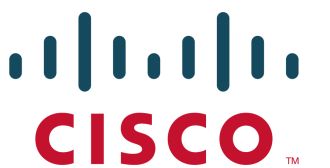 Networking giant Cisco believes that by the 2019 there will be half a billion people using wearable devices.
Networking giant Cisco believes that by the 2019 there will be half a billion people using wearable devices.Cisco said that 2.8 million wearables shipped last year and by 2019 there will be 16.4 million of us wearing gadgets of one sort or another.
The Daily Telegraph reports Cisco’s belief that each gizmo will churn out 569MB of data a month.
By 2019, according to Cisco, 4G networks will represent 88.2 percent of data traffic. Last year, 4G traffic amounted to 42.2 percent,
Cisco believes too that there will be 5.2 billion mobile users in 2019. It estimates last year there were 4.3 billion mobile users.
Where does Cisco get these figures from? No doubt it gazes into its crystal ball and extrapolates current figures using an abacus.
The jury is still well and truly out on wearable devices however – not everyone is totally convinced that having a gizmo built into your clothes is necessarily the flavour of the day.
China internet users number 649 million
And, significantly, a large percentage of those people use smartphones or mobile phones to access the net.
At the end of 2012, there were only 564 million people able to access the web, said the China Internet Network Information Centre.
While the 2014 figures showed a modest growth, there is still room for vendors because internet penetration is only 47.9 percent of the population – with many of those people living in rural areas.
Reuters reports that smartphone sales aren’t doing so well. It quotes government figures that showed 389 smartphones shipped in China in 2014, a drop from 423 million in 2013.
Some players like Google, Facebook and Twitter have practically no presence in mainland China.
The authorities there routinely censor many web sites and keep a sharp eye for blogs related to politics or to pornography.
Lenovo pips Amazon at the tablet game
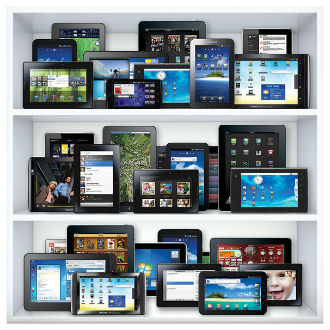 Apple continued to be the market leader for tablets in 2014 but it, in common with other vendors, showed a drop in sales.
Apple continued to be the market leader for tablets in 2014 but it, in common with other vendors, showed a drop in sales.A report from Trendforce said that the tablet industry has no reached the maturity point with shipments globally totalling 192 million units. That’s a fall of 2.2 percent compared to 2013.
Apple fared rather worse, it shipped 63.4 million units, a drop of 13.6 percent.
Number two in the pack was Samsung, but its shipments at 41 million units dropped only 2.5 percent.
Lenovo beat Amazon to take third place, and now has 5.6 percent market share.
Both Amazon and Google trailed behind, and Microsoft hasn’t really hit the numbers with its Surface Pro 3.
Some analysts believe that not only has the market reached maturity, but it’s hard to persuade people to upgrade. Others think that tablets are being squeezed on the one hand by larger screen size smartphones and others by low cost notebook PCs.
Microsoft reveals cloud roadmap
 Software company Microsoft said it has introduced a web site that reveals details of its roadmap for its Cloud Platform.
Software company Microsoft said it has introduced a web site that reveals details of its roadmap for its Cloud Platform.Microsoft has been aiming to move to the cloud as fast as it can and now offers cloud services including Azure, Intone, Visual Studio and server platforms including Windows Server, SQL Server. It also has covered system appliance offerings including Analytics and Stor System.
Takeshi Numoto, corporate vice president of the cloud and enterprise marketing group at Microsoft said the company wanted to be transparent about its cloud strategy.
He said that the web site, which you can find here, is intended to show what technology it’s developing and what’s coming in the next few months.
It also will include products in public preview.
Microsoft isn’t the only company struggling to re-invent itself as a cloud player. Others in the game include SAP, Oracle and IBM.
Analysts predict that over the next few years the majority of enterprise IT users will use cloud computing and services more and more.
Raspberry Pi 2 goes on sale
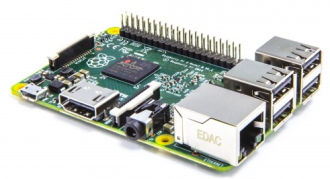 The people who make popular do-it-yourself circuit board said that they’ve released a new version of the device.
The people who make popular do-it-yourself circuit board said that they’ve released a new version of the device.The Raspberry Pi 2 sells for $35 – the same price as before, but now comes with a 900MHz quad core ARM Cortex A7 CPU, 1GB of SDRAM, and retains compatibility with the Raspberry Pi 1.
The board, popular with schools and enthusiasts can run all ARM GNU/Linux distributions as well as Microsoft Windows 10 – when it comes out.
The company said that Broadcom has created a new system on a chip BCM2836 for the device, which includes the 900MHz ARM chip – meaning there’s no upgrade difficulties.
The company said that it has worked with Microsoft over the last 10 months to prepare for the arrival of Windows 10. The Raspberry Pi 2 compatible version of Windows 10 won’t cost anything to manufacturers.









